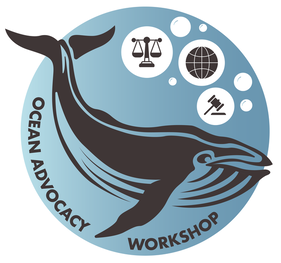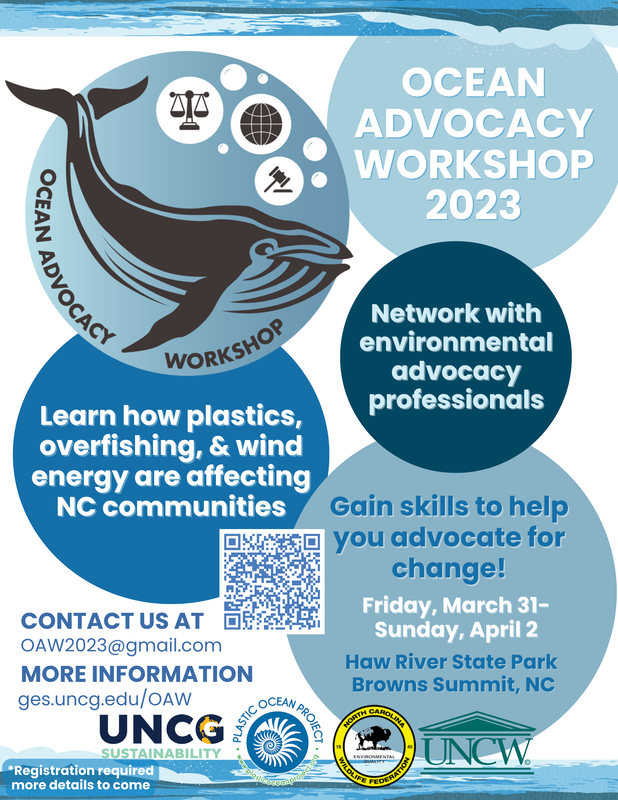Ocean Advocacy Workshop
|
The Ocean Advocacy Workshop, first hosted in 2022, is a first-of-its-kind event designed to teach participants how to champion for oceans and the environment.
The 2022 event met and exceeded our expectations. It was transformative to be able to hold the workshop at Haw River State Park, close to the natural world and apart from institutional settings. Nature has a way of taking us to our deepest places of caring and knowing. |
Over 97% of the participants surveyed said we should have the event again. The OAW 2023 will be held on March 31st to April 2nd, 2023 has been expanded to two full days and now includes a poster session for students to share their work.
The OAW is hosted by North Carolina State University, University of North Carolina Greensboro, North Carolina Wildlife Federation and Plastic Ocean Project
|
|
|
The 2023 Ocean Advocacy Workshop (OAW) will focus on the three issues that students will engage with described below: plastics, fisheries, and offshore wind energy.
Plastics. The amount of plastic trash that flows into the oceans every year is expected to nearly triple by 2040 to 29 million metric tons, including lost fishing gear, which is the deadliest form of marine plastic, as it catches and entangles wildlife. Thus, the seafood industry both impacts and is impacted by plastic pollution (National Geographic).
Fisheries. Historically, NC’s sounds and estuaries were highly productive nursery areas that provided vital habitat to juvenile fish before they mature and have an opportunity to spawn and reproduce. Destructive fishing practices have severely depleted the productivity of our sounds and estuaries. Total commercial landings for just 6 species were 24.7 million pounds compared to 5.2 million pounds in 2018, a decline of 79%. Policies based on sound science are needed to restore our marine ecosystems to their previous abundance (NC Wildlife Federation).
Offshore wind energy. Offshore wind energy is estimated to grow by 300% by 2050 and has the potential to avoid over 10 gigatons of greenhouse gas emissions (Project Drawdown). An educated and involved citizenry will be required to assure there is as little harm as possible from this promising source of energy to shape policies regarding mitigation for bird and bat strikes, sonic impacts to marine life including whales and dolphins, vibrations on the seafloor, and related environmental justice issues.
Plastics. The amount of plastic trash that flows into the oceans every year is expected to nearly triple by 2040 to 29 million metric tons, including lost fishing gear, which is the deadliest form of marine plastic, as it catches and entangles wildlife. Thus, the seafood industry both impacts and is impacted by plastic pollution (National Geographic).
Fisheries. Historically, NC’s sounds and estuaries were highly productive nursery areas that provided vital habitat to juvenile fish before they mature and have an opportunity to spawn and reproduce. Destructive fishing practices have severely depleted the productivity of our sounds and estuaries. Total commercial landings for just 6 species were 24.7 million pounds compared to 5.2 million pounds in 2018, a decline of 79%. Policies based on sound science are needed to restore our marine ecosystems to their previous abundance (NC Wildlife Federation).
Offshore wind energy. Offshore wind energy is estimated to grow by 300% by 2050 and has the potential to avoid over 10 gigatons of greenhouse gas emissions (Project Drawdown). An educated and involved citizenry will be required to assure there is as little harm as possible from this promising source of energy to shape policies regarding mitigation for bird and bat strikes, sonic impacts to marine life including whales and dolphins, vibrations on the seafloor, and related environmental justice issues.
|
**The 2023 Ocean Advocacy Workshop is currently being planned for Friday, March 31st through Sunday, April 2nd, 2023 at Haw River State Park in Browns Summit, NC.
Registration will be required. The 2023 Workshop will focus on plastics, fisheries, wind energy and inclusion and diversity in conservation. We will also be holding a poster session for students to present original research. Please complete this Interest Form below to stay informed.** Email [email protected] if you are interested in supporting the workshop or getting involved as a partner!
|




